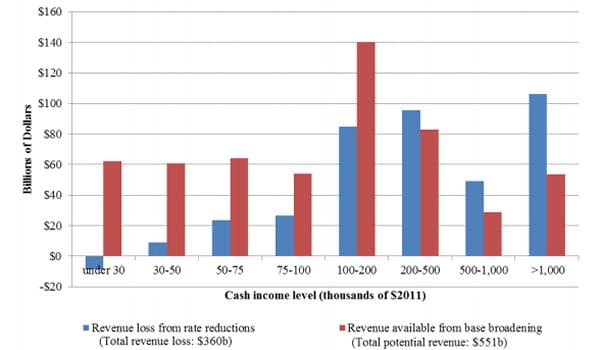Mitt Romney Budget would "Have to Raise Burdens on Middle Class"

of the Mitt Romney budget plan. The analysis is part hypothetical because Romney has not specified any specific loopholes that he would close to make up for the lost revenue from cutting the marginal tax rate. However, the report finds that if Mitt Romney does makes good on the promises he has proposed, the middle-class will necessarily bear the burden of higher taxes. Even when "financing of the plan via tax expenditure reductions as progressive as possible by assuming that tax expenditures would be eliminated from the top down."

The non-partisan Tax Policy Center has completed an analysis
On the campaign trail, we hear the same old mantra from both sides of the aisle: we need to reduce the tax burden on the middle-class, reduce spending, and balance the budget . Because neither party as proposed substantive spending decreases, the Republican plan would necessarily burden the middle class if they were to make good on their promise. Without addressing any impracticalities of the Democrat's plan, the Tax Policy Center explains:
The graph shows that cutting individual income tax rates by 20 percent from today’s levels would reduce tax burdens by $251 billion per year (in 2015) among households with income. Governor Romney has explicitly promised to retain current preferences for dividends and capital gains ... if we assume a strict interpretation of the second goal ... there are only $165 billion of available tax expenditures to close in that group if tax rates are cut).
The report goes on:
For example, if Governor Romney eventually specifies a full tax reform proposal that is not revenue-neutral and/or that raises taxes on some forms of saving and investment, there is no a priori reason why that full-reform proposal would have to raise taxes on middle-class households. Nevertheless, it remains true – as we showed in our paper – that a reform proposal that meets the five goals stated above would have to raise burdens on middle-class households.
The paper lists a few Q & A's to clarify their findings:
Q: How can you analyze Governor Romney’s proposals when there is no fully-specified Romneytax plan?Q: Did you say that Governor Romney wants to raise taxes on the middle-class?
The five goals are the policy center refers to are:
(1) cut current marginal income tax rates by 20 percent,(2) preserve and enhance incentives for saving and investment(3) eliminate the alternative minimum tax,(4) eliminate the estate tax, and(5) maintain revenue neutrality
With a bit of editorial liberty, how can a presidential candidate get away without specifying a single loophole that he would close to make up for such a significant budget shortfall?
 Chad Peace
Chad Peace

